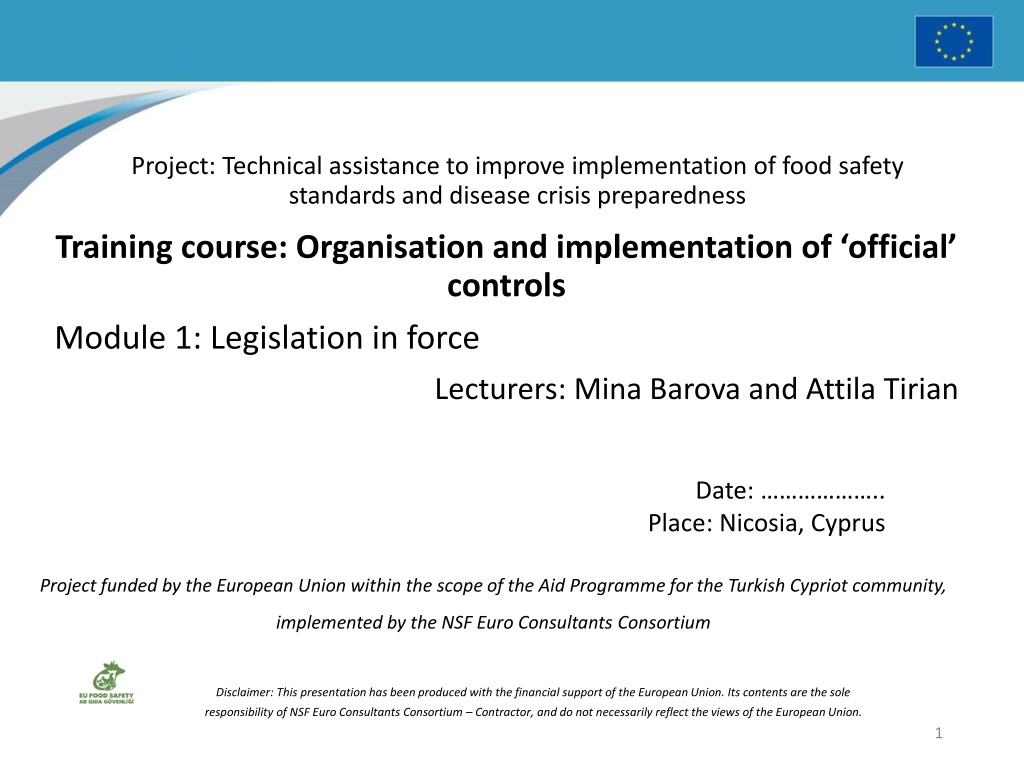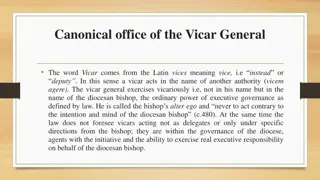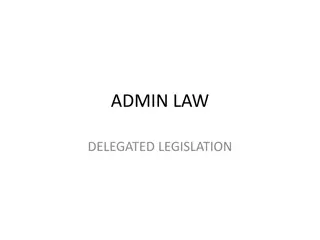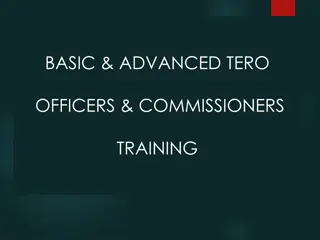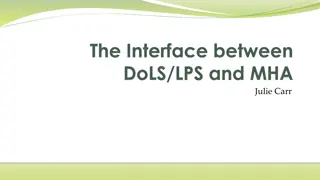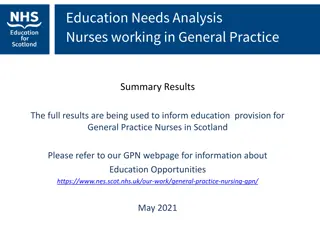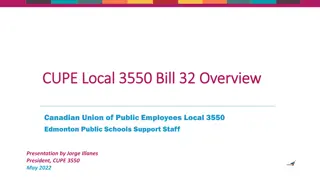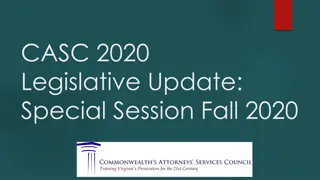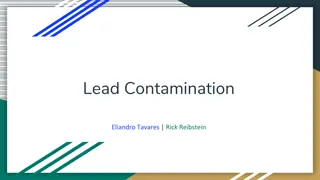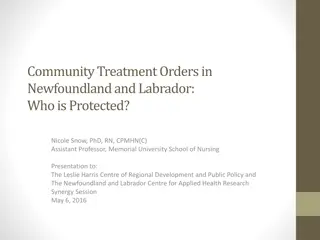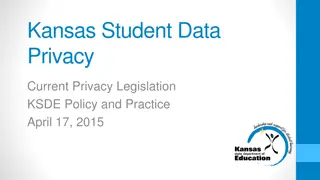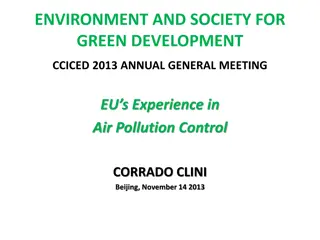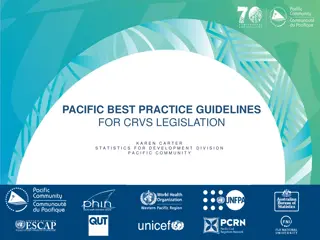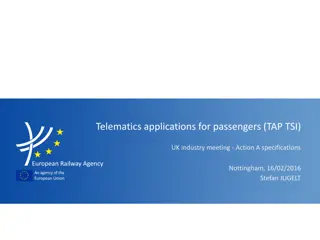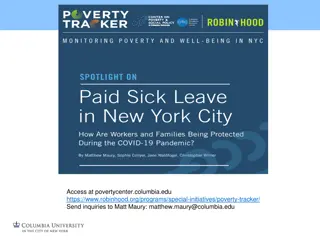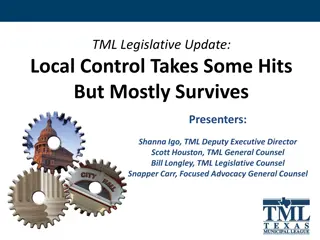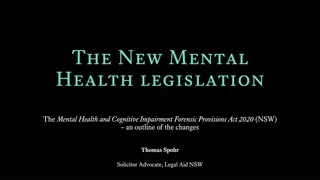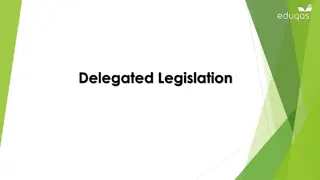Enhancing Food Safety Standards and Legal Compliance in Food Chain Operations
This project focuses on improving the implementation of food safety standards and preparedness for disease crises through training courses on official control procedures and legislation in force, funded by the European Union. The content discusses key regulations, legal perspectives, and responsibilities of food business operators in ensuring food safety and quality across the entire food chain.
Uploaded on Dec 12, 2024 | 0 Views
Download Presentation

Please find below an Image/Link to download the presentation.
The content on the website is provided AS IS for your information and personal use only. It may not be sold, licensed, or shared on other websites without obtaining consent from the author. Download presentation by click this link. If you encounter any issues during the download, it is possible that the publisher has removed the file from their server.
E N D
Presentation Transcript
Project: Technical assistance to improve implementation of food safety standards and disease crisis preparedness Training course: Organisation and implementation of official controls Module 1: Legislation in force Lecturers: Mina Barova and Attila Tirian Date: .. Place: Nicosia, Cyprus Project funded by the European Union within the scope of the Aid Programme for the Turkish Cypriot community, implemented by the NSF Euro Consultants Consortium Disclaimer: This presentation has been produced with the financial support of the European Union. Its contents are the sole responsibility of NSF Euro Consultants Consortium Contractor, and do not necessarily reflect the views of the European Union. 1
Some abbreviations OC(s) - Official Control(s) CA(s) - Competent Authorities MS(s) - Member State(s) OCR - Official Controls Regulation OV(s) - Official Veterinarian(s) NC - non-compliance GMP - Good manufactory practise HACCP - Hazard analysis and Critical Control Points AAC - Administrative Assistance and Cooperation IMSOC - Integrated Management System for Official Controls 2
Module 1: Legislation in force-General Regulation (EC) No 178/2002 - general food law Regulation (EC) No 852/2004 - hygiene of foodstuffs Regulation (EC) No 853/2004 - hygiene rules for food of animal origin Regulation (EC) No 625/2017 - official controls Registration and approval of FBOs 3
Legal perspective Legal frameworks are a key pillar in an effective food control system and regulates the production, trade and handling of food and hence covers the regulation of food control, food safety, quality and relevant aspects of food trade across the entire food chain, from the provision for animal feed to the consumers. In all countries, food is governed by a complexity of laws and regulations, which set out the government s requirements to be met by food chain operators to ensure food safety and quality. 4
Regulation (EC) No 178/2002 High level of protection of human life and health, the protection of consumer interests, including the fair practice in food trade. general principles and definitions traceability precautionary principle risk analysis EFSA RAS 5
Regulation (EC) No 178/2002 General principles the food business operator is responsible for producing safe food if reasons to suspect unsafe: FBO needs to withdraw products from the market or recall from consumers Definitions primary production retail risk Hazard Traceability Food and feed business operators shall be able to identify any person from whom they have been supplied with a food, a feed, a food-producing animal, or any substance intended to be, or expected to be, incorporated into a food or feed (refer to Commission Implementing Regulation (EU) No 931/2011) more information*- https://food.ec.europa.eu/horizontal-topics/general-food- law/food-law-general-requirements_en 6
Regulation (EC) No 178/2002 Precautionary principle provisional risk management measures can be taken when scientific uncertainty persists Risk analysis risk assessment: EFSA and MS risk management: Commission and CA in MS risk communication* *http://www.efsa.europa.eu/EFSA RAS (Rapid Alert System) MSs shall immediately notify of any measures restricting the placing or forcing the withdrawal or recall of food or feed any rejection at a EU border inspection post 7
Food Hygiene Package Regulations Clearly specify the FBOs obligations in respect to the general hygiene requirements of foodstuffs (Reg. 852/04) and specific rules on the hygiene of food of animal origin (Reg. 853/04) Further specifications of the requirements laid down in these Regulations and implementing measures have been adopted by mean of other Regulations (Reg. 2073/05, Reg. 2074/05, Reg. 2015/1375, etc.) Previously two more regulations: Reg. 882/04 and Reg. 854/04- replaced by Reg. 625/2017 8
Regulation (EC) No 852/2004 - characteristics all food stable to table (integrated approach) all stages of production, processing, distribution, exports primary responsibility: food business operator not: direct sale of primary products to final consumer registration of all food businesses general hygiene requirements temperature control requirements HACCP (all 7 principles) guides to good practice microbiological criteria 9
General hygiene requirements* infrastructure, layout, equipment raw materials (pre-) operational hygiene personal hygiene (dress; behaviour) water quality pest control food waste *Annex II to Regulation (EC) No 852/2004 10
Temperature control requirements cold chain transport of red meat (7 C) transport of white meat (4 C) transport of offal (3 C) cutting/deboning room (12 C) pasteurisation/sterilisation 11
HACCP Art. 5 of Regulation (EC) No 852/2004 all food business operators shall: implement a permanent procedure based on the HACCP principles except primary producers (farmers, fruit and vegetable producers, fishing vessels) 12
Guides to good practice national guides (Article 8) developed by the sectors validated by the competent authority register is available* * http://ec.europa.eu/food/food/biosafety/hygienelegislation/register_national_guides_en.pdf 13
Approved guides for industrial businesses in MSs - Examples grain mills soft drink industry mineral water industry beer industry distilled drinks fruit juice industry road transportation transportation by ship potato packaging egg products industry egg collection & packaging wholesale catering & drinks wholesale wine & distilled liquors cereals, seeds end dried legumes sugar production 14 14
Approved guides for small businesses in MSs - examples fish shops poultry shops institutional kitchens dairy & grocery sales general butcher shop, minced meat catering ice cream preparation supermarkets food sale at gas stations bakery products contract catering catering in sport facilities vegetable stores Ministerie van Volksgezondheid, Welzijn en Sport 15 15
Guides to good practice Community guides (Article 9) procedure feed: 5 food: wholesale markets (www. wuwm.org) egg products (www.eepa.info) natural sausage casing* egg laying flocks** packaged water*** * http://ec.europa.eu/food/food/biosafety/hygienelegislation/good_practice_en.htm ** http://ec.europa.eu/food/food/biosafety/salmonella/impl_reg_en.htm *** http://ec.europa.eu/food/food/biosafety/hygienelegislation/eu_guide_wholesale_market_management_2012_en.pdf Community guides (Article 9) microbiological classification of bivalve mollusc production & relaying areas* (cold stores, catering) * http://ec.europa.eu/food/food/biosafety/hygienelegislation/ community_guide_microbiological_monitoring_bivalve_mollusc_harvesting_areas_%20issue_en.pdf 16
Regulation (EC) No 853/2004 characteristics food of animal origin red and white meat, farmed and wild game, MSM, meat products, live bivalve molluscs, fishery products, raw milk & dairy products, eggs (& products), frogs legs, snails, rendered animal fat & greaves, treated stomachs, bladders & intestines, gelatine, collagen not: retail (new definition; except big retailers) 17
Regulation (EC) No 853/2004 - requirements (conditional) approval of establishments animals must be clean health mark for red meat carcase (by vet.) identification mark (by operator) (simplified) requirements for slaughterhouses & cutting plants emergency slaughter 18
Approval (art. 148)* application procedure on-site visit conditional (3-6 months) activities (codes may be added) up-to-date lists stop production, suspend, withdraw * Regulation (EC) No 625/2017 Annex IV of guidance document* approved establishments format (food, ABP, feed) third country establishment lists * to Regulation (EC) No 853/2004- (http://ec.europa.eu/food/food/biosafety/hygienelegislation/guid ance_doc_853-2004_en.pdf 19
Regulation (EC) No 625/2017-important elements Summary Background of Regulation 2017/625 General principles (art. 1 15) Sector specific requirements (art. 16 27) Delegation of tasks (art. 28 33) Laboratories, sampling, analysis, diagnosis (art. 34 42 and 92 101) Financing of controls (78-85) Administrative Assistance and Cooperation (AAC) and Integrated Management System for Official Controls (IMSOC) Planning and reporting Commission controls and Enforcement 20
Regulation (EC) No 625/2017 - important elements Confirms principles laid down in Reg (EC) 882/2004 Clarifies some aspects Introduces some novelties The scope of the new Regulation has been extended: (art. 1) and will now cover OCs to verify compliance with food and feed law, animal health and welfare, plant health, plant protection products, animal-by products, organic, quality schemes, marketing standards (fraud) rules; Animal by-products, under Reg. 1069/2009; Plant health including plant protection products, Reg. 2016/2031; Animal Health, Reg. 2016/429; 21
Regulation (EC) No 625/2017 - important elements The scope of the new Regulation has been extended : (art. 2) Official activities are to include Other Official Activities beyond Ocs Other official activities - other than OCs, which are performed by the CA, or by the delegated bodies or the natural persons to which certain other official activities have been delegated , including activities aimed at verifying the presence of animal diseases or pests of plants, preventing or containing the spread of such animal diseases or pests of plants, eradicating those animal diseases or pests of plants, granting authorisations or approvals, and issuing official certificates or official attestations. 22
Regulation (EC) No 625/2017 - important elements The following definitions are no longer part of the OCR: Inspection Monitoring (even if inspection is recalled at art. 14 on Methods and techniques for official controls ) Surveillance some activities carried out in the framework of OCs A new definition - official attestation is added to include 23
Regulation (EC) No 625/2017 - important elements Clarification: Official controls notice Reg. 2017/625 makes clear the principle according to which, in general, OCs must be performed without prior notice, except where such notice is necessary to the performance of the OC itself and duly justified for the official control to be carried out (as in case of OCs performed in slaughterhouses during slaughter operations) Even in case of OCs upon request from the operator, the CA may decide whether to give prior notice or not Anyhow, OCs with prior notice shall not preclude OCs without prior notice 24
Regulation (EC) No 625/2017 - important elements A stronger coordination among different CAs required (art. 4,2): Where, for the same area, a MS confers the responsibility to organise or perform OCs or other official activities on more than one CA ( ) the MS shall ( ) designate a single authority, , responsible for coordinating the cooperation and the contacts with the Commission and with other MSs in relation to the OCs and other official activities performed in each of the areas governed by the rules referred to in Article 1 (2). 25
Regulation (EC) No 625/2017 - important elements General obligations concerning the CAs (art. 5) (including the organic CAs) are confirmed: ensure the effectiveness and appropriateness of OCs and other official activities as well as their impartiality, quality and consistency at all levels by mean of a sufficient number of suitably qualified and experienced staff; ensure that staff performing OCs and other official activities are free from any conflict of interest; have, or have access to, an adequate laboratory capacity for analysis, testing and diagnosis; have, or have access to appropriate and properly maintained facilities and equipment; have the legal powers to perform OCs and other official activities and to take the relevant enforcement actions; have legal procedures in place in order to ensure that staff have access to the premises of, and documents kept by, operators; have contingency plans in place and be prepared to operate such plans in the event of an emergency, where appropriate. 26
Regulation (EC) No 625/2017 - important elements Training (art. 5.4): Staff performing OCs shall receive appropriate training enabling them to undertake their duties competently and to perform official controls and other official activities in a consistent manner Commission Delegated Reg. (EU) 2019/624 lays down minimum training requirements for the OVs, official auxiliary and the staff designated by the CAs The Commission may organise training activities for the staff of the CAs & other authorities (art. 130) 27
Regulation (EC) No 625/2017 - important elements Concept and practice of confidentiality (art. 8) Confirms a risk-based approach to OCs including risks connected to possible cases of fraudulent or deceptive practices Emphasizes the importance of food fraud control, in relation to: - a dedicated set of controls (9.2) - OCs frequency (art. 9.2 , 65.4, 73.2), - Frequency of Com controls in third countries (art.121) - official certificates principles (90), designating EU reference centers for the authenticity and integrity of the agri-food chain (97, 98), and the general rules for Administrative Assistance and Cooperation (102) penalties (139.2) transparency of OCs 28
Regulation (EC) No 625/2017 - important elements Articles 16 - 27 Lay down specific rules to perform OCs on sectors, like products of animal origin intended for human consumption, residues of relevant substances in food and feed, animal by-products, animal welfare, plant health, PDO, PGI and TSG products, etc., whose requirements are laid down in specific legal acts (e.g. Reg. EC 852/2004 and 853/2004, Reg. EC 1069/2011, Reg. 2016/2031, etc.) Additional requirements for official controls and other official activities in certain areas Notably, the role of official veterinarians is updated: it s possible that certain meat inspections are performed either by an official veterinarian or by an official auxiliary under his supervision or, if there are sufficient guarantees (risk- based*), under his responsibility. *Criteria and conditions are specified in Delegated Regulation (EU) 2019/624 and further specified in Implementing Regulation (EU) 2019/627] 29
Regulation (EC) No 625/2017 - important elements Delegation of tasks (art. 28-33) In respect of Reg. 882/2004, Reg. 2017/625 better qualifies control bodies as: delegated body a legal person to which the CAs have delegated certain OC tasks or certain tasks related to other official activities Or natural persons to which certain official control tasks have been delegated in accordance with the regulation Only delegated bodies are requested to work and to be accredited in accordance with standard EN ISO/IEC 17020 30
Regulation (EC) No 625/2017 - important elements Sampling, analyses, tests and diagnoses in the framework of Ocs: Reg. 2017/625 clarifies the application of general criteria for analytical, testing and diagnosing tests methods already provided for in Reg. 882/2004 (art. 34). CAs may designate as an official laboratory or National Reference Laboratory, a laboratory located in another Member State or in a third country that is a Contracting Party to the Agreement on the European Economic Area subject to conditions (art. 37.2 and 100.1) Audits of official laboratories: The CAs shall organise audits of the official laboratories (OL) they have designated, unless they find such audits to be redundant considering the accreditation assessment The CAs shall immediately withdraw the designation of an OL, either completely or for certain tasks, where it fails to take appropriate and timely remedial action when it is observed that: it no longer complies with the conditions on the basis of which it has been designated; it does not comply with the OLs obligations 31 it is underperforming at inter-laboratory comparative tests
Regulation (EC) No 625/2017 - important elements Second expert opinion The operators right to apply for a second expert opinion is strengthened. The way to grant the right for this second opinion is detailed (art 35) Sampling of animals and goods offered for sale by means of distance communication (art. 36) Samples of animals and goods ordered on-line by CAs without identifying themselves may be used for the purposes of an OC. CAs must, once they are in possession of the samples, ensure that the operators are informed and able to exercise the right to a second expert opinion. EU Reference Laboratories designation process (following a public selection process and being limited in time and with a minimum period of five years or reviewed regularly) art. 93+designation of European Union Reference Centres (animal welfare , authenticity and integrity of the agri-food chain, Frauds) EU reference laboratories and EU reference centres shall be subject to Commission controls to verify compliance with the requirements. 32
Regulation (EC) No 625/2017 - important elements Financing OCs and other official activities (art. 78-85) OCs financing general criteria are confirmed: adequate financial resources shall be made available to perform OCs and other official activities Mandatory fees or charges: MS shall collect fees or charges to cover the costs following the detection of a case of non-compliance by the same operator, during an OC and to assess the extent and the impact of the NC Of OCs carried out on request of the operator itself In case of temporary increased import controls Other fees or charges (non mandatory) Method for calculating fees or charges 33
Regulation (EC) No 625/2017 - important elements Administrative Assistance and Cooperation (AAC) art. 102 108 A deadline for answering following a request is defined, both in case of assistance on request and assistance without request Assistance on request: MS must indicate, within ten working days, the estimated time necessary to provide an informed response. (art 104) When the CAs in a MS become aware of a case of NC that could have implications for another MS, it shall notify such information to the CAs of that other MS without undue delay (Assistance without request) (art 105) CAs in the notified MS, where requested, must indicate within ten working days what investigations they intend to carry out or why no investigation is necessary and other relevant information. 34
Regulation (EC) No 625/2017 - important elements IMSOC (Information Management System for Official Controls) scope and functionalities IMSOC shall allow the computerised handling and exchange (in real time) of information, data and documents necessary for the performance of OCs, resulting from the performance of OCs or the recording of the performance of OCs or the outcome of OCs 35
Regulation (EC) No 625/2017 - important elements Multi-annual national control plans (MANCP) (art. 109 113): ensure that OCs are performed by the CAs on the basis of a MANCP, the preparation and implementation of which are coordinated across their territory . designate a single body tasked with coordinating the preparation of the MANCP and ensuring its coherence. make the MANCP available to the public, with the exception of those parts of the plan the disclosure of which could undermine the effectiveness of OCs . Annual reports (art. 113 114) deadlines: By the end of August of each year, MSs shall submit to the Commission a report summarising the official activities carried out the previous year in the framework of the MANCP. By 31 January every year, the Commission shall make available to the public an annual report on the operation of official controls in the Member States and may contain recommendations on possible improvements to the OC systems in the MS. 36
Regulation (EC) No 625/2017 - important elements Enforcement actions: Action to be perform in case of suspicion of NC (e.g. OCs intensification, seizure of animals and goods and of any unauthorized substances or products) are outlined. The CAs shall perform an investigation in order to confirm or to eliminate that suspicion (art. 137) The Commission is empowered to adopt delegated acts laying down rules for the performance of the OCs in case of suspicion of NC in certain areas (art. 19, 20) Sanctions and Fraud (art.139) Reporting of infringements and protection for persons reporting an infringement MSs shall ensure that CAs have effective mechanisms to enable reporting of actual or potential infringements of Reg. 625 including: procedures for the receipt of reports of infringements and their follow-up appropriate protection for persons reporting an infringement and their personal data in accordance with EU and national law 37
Regulation (EC) No 625/2017 - important elements Conclusion: Reg. (EU) 2017/625 confirms the general principles of Reg. 882/2004, expands the scope of OCs to include any activity connected to the agri-food chain (plants + animal by-products included in the scope) increases the quality of official controls, modernises the legislation and strengthens the legal basis against food fraud Reg (EU) 2017/625 does not lay down new requirements for the operators in addition those in the relevant legislation The need to effectively contrast (food) frauds is stressed Activities performed by CAs shall be carried out transparently and shall be publicised Integration and cooperation among CAS operating at any level is improved. Existing IT systems shall be integrated To complete the structure of the future OCs system, a series of implementing and delegated acts shall be (have been) adopted by the Commission 38
Guidance documents Regulation (EC) No 178/2002* Regulation (EC) No 852/2004* Regulation (EC) No 853/2004* HACCP (2 parts)* - how to implement (Codex) - flexibility import requirements (2)* auditing (Decision 2006/677/EC) multi-annual control plans (2007/363/EC) annual report of MANCP (2008/654/EC) official controls of microbiological criteria* FAQ on flexibility for FBO and CA* * = see DG SANCO website 39
CONTACT Project e-mail: foodsafetyprojectTCc@gmail.com THANK YOU FOR YOUR ATTENTION Project funded by the European Union within the scope of the Aid Programme for the Turkish Cypriot community, implemented by the NSF Euro Consultants Consortium
